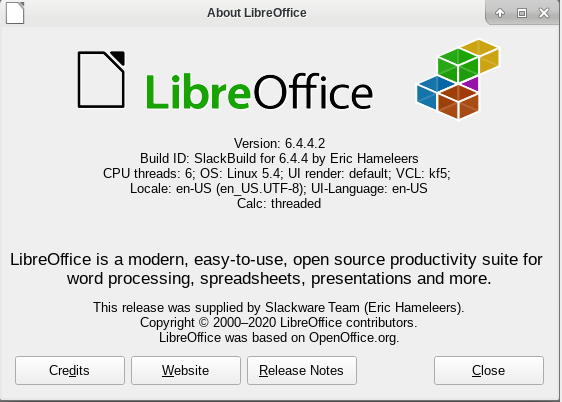 The Document Foundation released the latest version of LibreOffice (6.4.4) yesterday, and I compiled a set of packages for Slackware -current. Unfortunately Slackware 14.2 is stuck at LibreOffice 6.2.x because newer source releases can not compile against the old libraries of our stable platform anymore).
The Document Foundation released the latest version of LibreOffice (6.4.4) yesterday, and I compiled a set of packages for Slackware -current. Unfortunately Slackware 14.2 is stuck at LibreOffice 6.2.x because newer source releases can not compile against the old libraries of our stable platform anymore).
Get the packages – as usual – from my own server or one of its mirrors; https://slackware.nl/people/alien/slackbuilds/libreoffice/ (rsync://slackware.nl/mirrors/people/alien/slackbuilds/libreoffice/) or https://slackware.uk/people/alien/slackbuilds/libreoffice/ (rsync://slackware.uk/people/alien/slackbuilds/libreoffice/)

I will repeat my message from earlier posts about using my LibreOffice on Slackware: among the packages for LibreOffice that are targeting Slackware-current, you will find a “libreoffice-kde-integration” package which adds Qt5 and KDE5 (aka Plasma5) support to the LibreOffice suite.
If you run Slackware-current but do not have KDE5 packages installed at all, don’t worry. LibreOffice will work great – the KDE integration package just will not add anything useful for you. On the other hand, if you have Plasma5 installed you will benefit from native file selection dialog windows and other integration features. And even if you do not have Plasma5 but you do have Qt5 installed, then you will be able to run LibreOffice with Qt5 User Interface elements instead of defaulting to GTK3.
Note that the libreoffice package installs a profile script for bash and csh compatible shells into /etc/profile.d/ which you can edit to force a particular widget set for the LibreOffice User Interface if you are not happy with the default choice LibreOffice makes.
If you want to compile LibreOffice 6.4.4 packages yourself using my SlackBuild script, then be aware that by default the KDE5 support is disabled. This will of course change when KDE Plasma5 becomes part of Slackware. You will have to set the value of the script parameter “ADD_KDE5” to “YES” for now. Additionally you will have to install the packages that this functionality depends on otherwise the compilation will fail.
Read the ‘README.kde5‘ file in the source directory for the list of packages you’ll need. All of the required packages can be found in my ‘ktown’ repository: https://slackware.nl/alien-kde/current/latest/
Enjoy! Eric
Recent comments